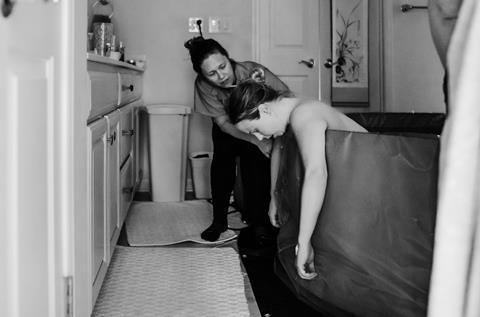Midwife Chloe Edmonds explains why she would encourage her mothers to explore their mystical connection with Christ when giving birth.

As a midwife I could talk for hours about the unleashing of female strength through empowered birth, and how to approach birth as a sacred encounter with your own imago-dei (the unique image of God within you) and with God. Birth is a sacred experience, where God is intrinsically present from beginning to end, seeing it as no less mystical than the hidden budding of a seed underground, and no less normal than the first blossom of spring.
It is both spiritual and natural and our approach to birth should be both rational consideration and great wonder and mystery. I see hypnobirthing as a tool and practice – yes, spiritual practice, as I view it as an enabler to heal and prepare the inner self for the experience of birth.
There is a small body of evidence around hypnobirthing and its affects on a birthing person’s experience. Most is high quality evidence on a small scale due to a lack of funding for research on complementary therapies. However, what we are coming to know both from these small research papers and anecdotally, is that hypnobirthing can improve pain perception, shorten length of labour, reduce trauma, and empower birthing people to feel more centered in their choices around birth.
Hypnobirthing can improve pain perception, shorten length of labour, reduce trauma, and empower birthing people to feel more centered in their choices around birth.
So why not use it? There can be caution in Christian circles about utilising therapies that access the subconscious mind. Birth hypnotherapy does that – it is using mechanical tools to relax the body and mind to a state of deep relaxation. This state will enable the movement of neuro-pathways in the brain through phrases or concepts repeated multiple times to the user, while in this hyper relaxed state. It is mostly a form of self-directed therapy (most people use books or podcasts/downloads), but can be given by a trained practitioner in a class setting. It is particularly useful to those who are birthing for the first time, or have had previous physiological or psychological trauma, or who are afraid of birth (tocophobia).
Another hesitation around methods used in forms of therapy such as visualisation, mantras and cultivating a meditative state, likely comes from misinformation within Christian culture and a well-natured apprehension in engaging with practices that have roots in religious backgrounds that are not Christianity.
Hypnotherapy itself is a hybrid of some traditional eastern orthodox (Christian) and Buddhist methodologies, but also well-researched scientific techniques utilizing the neuroplasticity of the brain. It is useful to understand the science behind these tools and their usefulness in psychological practice for healing, and also to have insight into how these methods have been co-opted by Christians for centuries, particularly within the monastic tradition/early church.
There can be caution in Christian circles about utilising therapies that access the subconscious mind. Birth hypnotherapy does that.
Firstly, achieving a hyper relaxed state is something known to all of us – scientifically it is the behavior of the brain right before sleep and on waking – known sometimes as a bliss state, before active consciousness kicks in. Many will recognise in a difficult period of life, it takes a few moments for dread to dawn, or on Christmas Day there is a moment of nominal unawareness before you realise – it’s Christmas! That moment of absent-mindedness is the hyper-relaxed state and in this space your brain has a lot of freedom to make changes to its set neuro-pathways.
For example prior to entering a relaxed state one may identify a fear relating to birth, and then in the relaxed state the practice would be to begin replacing that fear with a statement such as: "I trust my body to birth safely". This enables changes of mindset more easily than just using willpower as it exercises the way God has created the brain in order to heal or correct or change ways of thinking.
Some Christian psychologists suggest that may be why Psalmists emphasise morning meditation, perhaps ancient wisdom around the way the brain works that science was later to discover. This leads us to recognising the role of meditation, visualisation and the use of mantra within Christian practice. It has been well used within contemplative Christian circles in history. Some examples of visualisation are the imagination prayers of Jesuit practice, Teresa of Avila’s image based interactions with God, and more recently Richard Forsters description of visual meditation in The Celebration of Discipline.
Some Christian psychologists suggest that may be why Psalmists emphasise morning meditation.
None of these saints have felt that these practices are out of place within a Christian life; in fact they have felt they are essential to engage the consciousness with God and develop a greater awareness of Gods presence in all of life.
The fear that practices such as these may be opening one up to alternative spiritualities or spirits is, in my opinion unfounded in the biblical understanding of Christianity. When Jesus is Lord of our lives and the Holy Spirit lives within us, we do not need to be afraid of anything, in fact we have victory over every other spirit in Jesus. In my understanding this gives us liberty from fear and a sound mind to use tools that have a known benefit, as God works with them to heal and strengthen us. Interacting with ourselves on a subconscious level and uncovering the psyche is not something to be afraid of but instead to explore with freedom, knowing that what God has made and sanctified is good… and that self-knowledge and awareness can deepen our understanding of God. As Augustine prayed: "Let me know myself, let me know you."
Happy Birthing!
































No comments yet